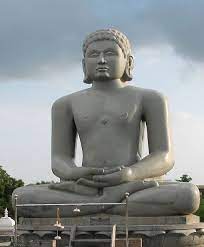Jainism, one of the oldest religions, is a beacon of profound spirituality, ethical living, and non-violence. Rooted in ancient India, Jainism’s principles and practices continue to resonate across time, offering a profound philosophy that transcends boundaries.
At its core, “Jainism revolves around three fundamental principles: Ahimsa (non-violence), Satya (truth), and Aparigraha (non-possessiveness). Ahimsa, in particular, encapsulates the essence of Jain teachings, emphasizing a commitment to non-violence in action, thought, and speech.” The Jains strive to live harmoniously with all beings, advocating compassion and respect for all life forms, no matter how small.
The Jain path towards spiritual liberation, or moksha, centres on pursuing self-realization and detachment from worldly attachments. The concept of karma holds immense significance in Jainism. It stipulates that every intentional or unintentional action accumulates karma—subtle particles that bind the soul to the cycle of birth and rebirth. Jains aim to purify their karma through rigorous self-discipline and righteous conduct and ultimately attain liberation.
Facts about Jainism:
Jainism encompasses two major sects: the Digambara and the Svetambara. The Digambara sect believes in asceticism, advocating complete nudity as a means to detach from material possessions. On the other hand, the Svetambara sect allows its adherents to wear white robes, emphasizing spiritual purity through detachment rather than physical nudity. Despite these differences, both sects uphold the core Jain principles of non-violence, truth, and non-possessiveness.
The Jain community is known for its philanthropic endeavours, social activism, and dedication to education. Their commitment to environmental conservation and vegetarianism aligns seamlessly with their principle of Ahimsa, reflecting a deep respect for nature and all living beings.
Jain temples, adorned with intricate architecture and vibrant colours, serve as spiritual sanctuaries where devotees gather to meditate, reflect, and pay homage to revered Jain deities and Tirthankaras—enlightened beings who have attained liberation and serve as role models for the Jain community.
In contemporary society, Jainism’s teachings offer invaluable guidance on leading a life of moral integrity, peaceful coexistence, and mindfulness. The Jain philosophy’s relevance extends beyond the confines of religion, resonating with individuals seeking a path towards inner harmony and spiritual awakening.
In conclusion,
Jainism is a profound testament to the power of non-violence, truth, and spiritual evolution. Its enduring legacy continues to inspire individuals worldwide, emphasizing the significance of compassion, ethical conduct, and reverence for all life forms on the journey towards enlightenment and liberation.

